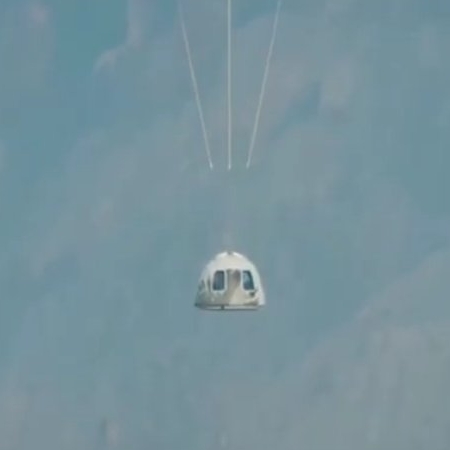Top engineers and managers fleeing Blue Origin
According to this story today, Blue Origin this summer lost at least sixteen top management and engineering employees, all leaving in a very short time.
At least 16 key leaders and senior engineers have left Blue Origin this summer, CNBC has learned, with many moving on in the weeks after Bezos’ spaceflight.
…Others quietly updated their LinkedIn pages over the past few weeks. Each unannounced departure was confirmed to CNBC by people familiar with the matter. Those departures include: New Shepard senior vice president Steve Bennett, chief of mission assurance Jeff Ashby (who retired), national security sales director Scott Jacobs, New Glenn senior director Bob Ess, New Glenn senior finance manager Bill Scammell, senior manager of production testing Christopher Payne, New Shepard technical project manager Nate Chapman, senior propulsion design engineer Dave Sanderson, senior HLS human factors engineer Rachel Forman, BE-4 controller lead integration and testing engineer Jack Nelson, New Shepard lead avionics software engineer Huong Vo, BE-7 avionics hardware engineer Aaron Wang, propulsion engineer Rex Gu, and rocket engine development engineer Gerry Hudak.
Those who announced they were leaving Blue Origin did not specify why, but frustration with executive management and a slow, bureaucratic structure is often cited in employee reviews on job site Glassdoor.
There is another possibility that would be more hopeful. It could be that Jeff Bezos is shaking up the company because of its poor accomplishments during the past four years, since CEO Bob Smith was hired.
That Smith however is still there makes this guess unlikely. The article also notes that Smith’s approval among Blue Origin employees is abysmal, with only 15% approving his management, when compared to high numbers given to the management leaders at SpaceX and ULA.
Thus, this exodus is more likely a sign that that the rats are fleeing what they see as a sinking ship.
It would be a mistake to dismiss Blue Origin however. The company is swimming in dough because of Bezos’ deep pockets, and he is free to do what he thinks must be done to fix things. Under such conditions it is very unlikely Blue Origin will disappear. More likely Bezos will straighten things out, though the company now has to play big catch up, not only against SpaceX but also against the fleet of new orbital rocket companies about to come on line — all doing so ahead of Blue Origin.
There is also the possibility that this story has got its facts wrong. It makes a very big error near the beginning, claiming that former SpaceX engineer Lauren Lyons had left Blue Origin to join SpaceX, when she had actually left SpaceX to take a big promotion at Firefly. My mistake. Lyons had moved from SpaceX to Blue Origin. This job change was leaving Blue Origin to go to Firefly.
Hat tip to reader Jay.
According to this story today, Blue Origin this summer lost at least sixteen top management and engineering employees, all leaving in a very short time.
At least 16 key leaders and senior engineers have left Blue Origin this summer, CNBC has learned, with many moving on in the weeks after Bezos’ spaceflight.
…Others quietly updated their LinkedIn pages over the past few weeks. Each unannounced departure was confirmed to CNBC by people familiar with the matter. Those departures include: New Shepard senior vice president Steve Bennett, chief of mission assurance Jeff Ashby (who retired), national security sales director Scott Jacobs, New Glenn senior director Bob Ess, New Glenn senior finance manager Bill Scammell, senior manager of production testing Christopher Payne, New Shepard technical project manager Nate Chapman, senior propulsion design engineer Dave Sanderson, senior HLS human factors engineer Rachel Forman, BE-4 controller lead integration and testing engineer Jack Nelson, New Shepard lead avionics software engineer Huong Vo, BE-7 avionics hardware engineer Aaron Wang, propulsion engineer Rex Gu, and rocket engine development engineer Gerry Hudak.
Those who announced they were leaving Blue Origin did not specify why, but frustration with executive management and a slow, bureaucratic structure is often cited in employee reviews on job site Glassdoor.
There is another possibility that would be more hopeful. It could be that Jeff Bezos is shaking up the company because of its poor accomplishments during the past four years, since CEO Bob Smith was hired.
That Smith however is still there makes this guess unlikely. The article also notes that Smith’s approval among Blue Origin employees is abysmal, with only 15% approving his management, when compared to high numbers given to the management leaders at SpaceX and ULA.
Thus, this exodus is more likely a sign that that the rats are fleeing what they see as a sinking ship.
It would be a mistake to dismiss Blue Origin however. The company is swimming in dough because of Bezos’ deep pockets, and he is free to do what he thinks must be done to fix things. Under such conditions it is very unlikely Blue Origin will disappear. More likely Bezos will straighten things out, though the company now has to play big catch up, not only against SpaceX but also against the fleet of new orbital rocket companies about to come on line — all doing so ahead of Blue Origin.
There is also the possibility that this story has got its facts wrong. It makes a very big error near the beginning, claiming that former SpaceX engineer Lauren Lyons had left Blue Origin to join SpaceX, when she had actually left SpaceX to take a big promotion at Firefly. My mistake. Lyons had moved from SpaceX to Blue Origin. This job change was leaving Blue Origin to go to Firefly.
Hat tip to reader Jay.

